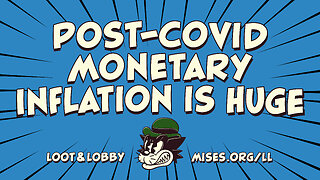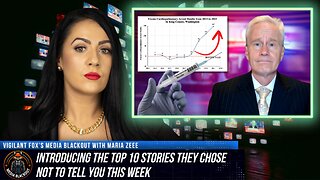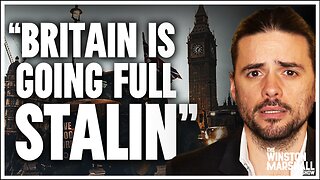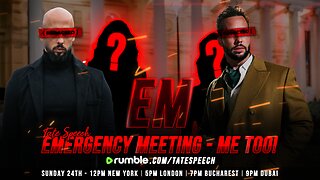Premium Only Content

The Green New Deal
Disastrous economic interventionist policies in the early 1900s helped spark a devastating global economic depression starting in 1929. President Franklin Roosevelt came to power during this time and used the Great Depression as a justification to mount a progressive coup against the political traditions of America.
It is with this same ambition that his successors in the Democrat Party have sought to leverage concerns about global warming and fossil fuels to wipe out what remains of the American market economy.
While the “Green New Deal” label has been attached to a variety of policy proposals over recent years, all of them share several common characteristics.
First, the cause of the “environment” and boosting “alternative energy sources” allows for a takeover of almost all aspects of the American economy. Agriculture, for example, must be regulated to limit the bio emissions of crops, cattle, and other livestock. Building equipment must be controlled due to its impact on energy demands. Transportation isn’t only a multibillion industry in itself, but indirectly impacts the employment of everyone in society.
Of course, in the modern political environment, environmentalist concerns must also take into account intersectionality and social justice, incorporating race, gender, sexuality, and all the rest into proposals of job guarantees, subsidies, and other forms of wealth redistribution baked into the specific proposal of the day.
How would such a Green New Deal be financed? As was the case with the New Deal, the answer is through debt and central bank inflation.
In fact, the size and scale of modern proposals have resulted in a renewed interest in what is called modern monetary theory, which contends that governments are free to spend and print as much money as they desire. In practice, similar policies have resulted in hyperinflation and economic devastation in nations like Argentina and Venezuela.
Another common feature of Green New Deal proposals is how obviously unserious they are about actually dealing with climate change and carbon emissions.
And this is the problem, the underlying agenda of the campaign to radically shift away from fossil fuels is not to protect the environment. It is to reform almost every aspect of modern society for political gain.
Given the foundational role that cheap, dependable, accessible energy has played in cultivating both human liberty and human thriving, defending the energy sources the world relies on every day is directly related to defending civilization itself.
______________________________________
Want to learn more?
For more animated content, check out Economics for Beginners at https://BeginEconomics.org.
-
 4:14
4:14
Mises Institute
1 month ago $0.05 earnedWhy the Money Supply Is Growing Again
2182 -
 2:23:21
2:23:21
SOLTEKGG
9 hours ago $5.06 earned🟢 First Day on RUMBLE!
56.3K5 -
 LIVE
LIVE
Vigilant News Network
12 hours agoCOVID-Vaccinated Hit With Grave New Reality | Media Blackout
1,824 watching -
 1:26:31
1:26:31
Josh Pate's College Football Show
12 hours ago $4.00 earnedSEC Disaster Saturday | Major CFP Earthquake Coming | Officiating Is A Disaster | New Studio Debut
37.9K2 -
 1:43:05
1:43:05
Adam Does Movies
16 hours ago $5.39 earnedGladiator II Spoiler Conversation With Hack The Movies
36.5K2 -
 24:10
24:10
Bwian
16 hours agoI Don't Know What I'm Doing in Fortnite, But I Still Won...
28.8K2 -
 19:30
19:30
DeVory Darkins
18 hours ago $44.97 earnedJoe Rogan MOCKS The View as Bill Maher HUMILIATES Woke Scientist
104K161 -
 11:25:41
11:25:41
Scottish Viking Gaming
19 hours agoSUNDAY FUNDAY | Jump into my Sons of the Forest Game | DOO EET NOWWA!
99.5K2 -
 24:01
24:01
Winston Marshall
4 days agoThe TRUTH About The UK Farmer Protest What No One Is Talking About...
88.6K259 -
 3:21:56
3:21:56
Tate Speech by Andrew Tate
23 hours agoEMERGENCY MEETING EPISODE 93 - ME TOO!
321K219